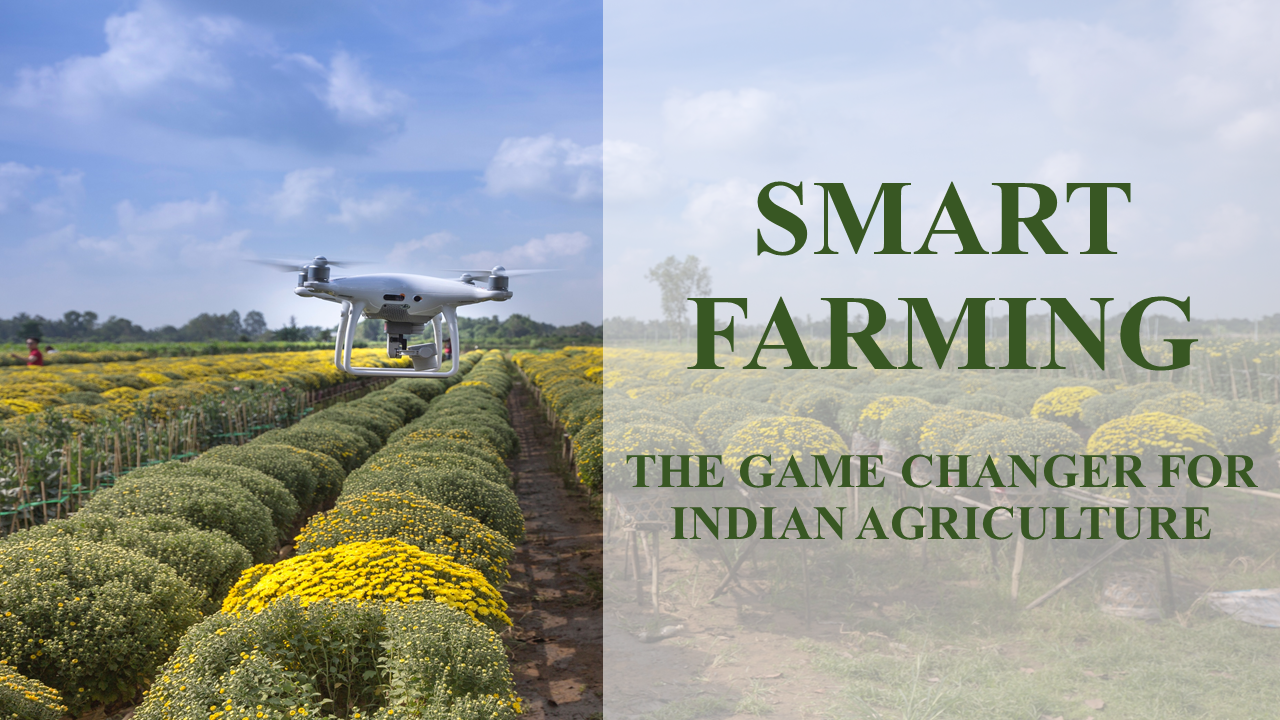Agriculture, the backbone of our nation has seen many revolutions, whether it is the domestication of animals for farming a few thousand years ago, the systematic use of crop rotation and improved farming practices or the green revolution with systematic breeding and adequate use of pesticides and fertilizer that changed the course of history in farming, a few decades ago. Agriculture in today’s world because of the growing demand for food, the need for efficient use of natural resources, and the stress on production and productivity is undergoing a fourth revolution triggered by the use of Information and communication technology (ICT) in the field of agriculture.
The area of the land available for farming has been decreasing year by year. If India wants to increase its current food output, then it has to increase its productivity posing no additional danger on the environment. This is by welcoming our nation to the world of smart farming.
Smart farming is a concept of doing farming by using modern-day tools and technology to increase the production, productivity, and quality of the harvest through remote sensing.
It includes a wide range of technologies including internet of things (IoT), robotics, blockchain technology, big data analysis, and Artificial intelligence (AI) to form an integrated network of the crop management system to increase the profit of farmers, reduce waste and keep the environment safe.
It provides the agriculture industry with advanced technological information for tracking, monitoring, automation, and analyzing operations in commercial agriculture sectors. Smart farming also helps in demand forecasting and releasing of goods to the market at the right time, reducing wastage.
How smart farming work?

Sensors and drones help in taking high-quality images that reveal details minutely and helps in pointing out the fundamentals like how much quantity of fertilizer and water is required in the field.
Big Data helps in recognizing the basics information about plants and livestock. Afterward, these basic details like plant growth and livestock performance can be finely tuned using data analytics. It can also be used for risk management and reducing operational costs.
Global Positioning System (GPS) helps farmers to work in a challenging environment like rain effectively.
Artificial intelligence (AI) can be used for harvesting of the crops, spray of pesticides, and fertilizers using drone technology.
Internet of things (IoT) helps in improving productivity by cutting down the waste and enhancing water usage by automating the irrigation system. It can also be used for creating smart greenhouses to control climatic conditions. Cloud servers are used to access the system and process the data.
A Farmer from the last few years is not only a person with a fondness for traditional agriculture, but he/she is also very well informed of the current technologies and has access to smartphones, GPS, soil scanning and internet of things technology.
By gauging the details of the field or variations within the field, smart farming can give farmers added value in the form of better decision formulation and resource management. It helps in doing precise agriculture through the management of spatial and temporal variables and thus increasing the economic returns and also helps in reducing environmental impact. It also includes the Decision Support System (DSS) for farm management to optimize returns on the inputs while also preserving resources. Smart farming can also help in monitoring animals and help in adjusting their diet according to their needs reducing the risk of diseases and improving their health which ultimately results in a better quality of output from these animals.
Changing from traditional agricultural practices to smart farming comes with not only opportunities but also many challenges. Advocates and skeptics of technology all need to come together and discuss the future development of farming in the digital era. The concept of smart farming is only possible if technology, diversity of crops, institutions, and markets all come together to support smart farming.
Smart farming is key for the future of the agriculture industry and a step towards sustainable agriculture.




